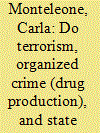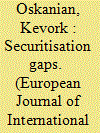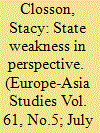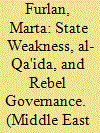|
|
|
Sort Order |
|
|
|
Items / Page
|
|
|
|
|
|
|
| Srl | Item |
| 1 |
ID:
143656


|
|
|
|
|
| Summary/Abstract |
In 2014, the UN Security Council emphasized the dangers of terrorism, criminal activity (especially drug production and trafficking), and state weakness in conflict areas. However, neither policy debates nor scholarly analyses have focussed on the potential impact of these elements on conflict dynamics and characteristics, and the investigated partial relationships have led to inconclusive results. This article explores the presence in armed conflicts of terrorist groups among fighting parties, major drug production (indicating the presence of activities typical of criminal organizations), and state failure in the period 1990–2011. Focussing on intrastate conflicts, this article highlights that, while when they are isolated their impact on armed conflicts is limited, when the three factors are simultaneously present, the interactions among them create a sort of threshold effect capable of affecting conflict characteristics and, in particular, conflict duration and incompatibility.
|
|
|
|
|
|
|
|
|
|
|
|
|
|
|
|
| 2 |
ID:
181131


|
|
|
|
|
| Summary/Abstract |
This article contributes a securitisation-based, interpretive approach to state weakness. The long-dominant positivist approaches to the phenomenon have been extensively criticised for a wide range of deficiencies. Responding to Lemay-Hébert's suggestion of a ‘Durkheimian’, ideational-interpretive approach as a possible alternative, I base my conceptualisation on Migdal's view of state weakness as emerging from a ‘state-in-society's’ contested ‘strategies of survival’. I argue that several recent developments in Securitisation Theory enable it to capture this contested ‘collective knowledge’ on the state: a move away from state-centrism, the development of a contextualised ‘sociological’ version, linkages made between securitisation and legitimacy, and the acknowledgment of ‘securitisations’ as a contested Bourdieusian field. I introduce the concept of ‘securitisation gaps’ – divergences in the security discourses and practices of state and society – as a concept aimed at capturing this contested role of the state, operationalised along two logics (reactive/substitutive) – depending on whether they emerge from securitisations of the state action or inaction – and three intensities (latent, manifest, and violent), depending on the extent to which they involve challenges to state authority. The approach is briefly illustrated through the changing securitisation gaps in the Republic of Lebanon during the 2019–20 ‘October Uprising’.
|
|
|
|
|
|
|
|
|
|
|
|
|
|
|
|
| 3 |
ID:
097783


|
|
|
|
|
| Publication |
2010.
|
| Summary/Abstract |
The conventional wisdom is that weak and failed states are at great risk of becoming havens for transnational terrorist and guerilla groups. The assumption is that lack of enforcement capabilities enables militant organizations to infiltrate and fill the "vacuum of power" that is created in the absence of a strong state. This article argues, though, that this is only one of the ways in which weak states are attractive to militant groups. It explores the various mechanisms through which the vacuum of power translates into opportunities for such groups. These mechanisms include the easiness of acquiring support and recruitment within refugees or marginalized populations; the ability of the violent non-state transnational organization to establish a "surrogate state" in supplying institutions and services that enhance its public appeal; the relations between civil or communal conflict and the success of such groups; and the use of transnational violent groups as proxies for other states. Using the Palestinian Liberation Organization (PLO) and Hezbollah in Lebanon as the primary cases, as well as two mini-cases from Central America and Africa, the paper illustrates the working of these mechanisms and contributes to our understanding of the relations between state weakness and transnational violent non-state organizations.
|
|
|
|
|
|
|
|
|
|
|
|
|
|
|
|
| 4 |
ID:
088889


|
|
|
|
|
| Publication |
2009.
|
| Summary/Abstract |
Taking the case of Georgia, this article considers the role of politico-economic networks in weakening the energy sector in a post-Soviet state. It is hypothesised that incentives, from financial gain to the provision of goods and services, encourage a multitude of actors to create an alternative system to the state. It concludes that in a weak state, networks have replaced legitimate channels of communication and no amount of foreign financial or technical assistance can make up for the lack of will among the stakeholders to develop an efficient energy system.
|
|
|
|
|
|
|
|
|
|
|
|
|
|
|
|
| 5 |
ID:
186011


|
|
|
|
|
| Summary/Abstract |
As the Arab Spring arrived in Yemen, al-Qa'ida joined the insurgency, conquered territories, and governed them. Eleven years later, I aim to assess whether the conditions that led to the group's emergence as both insurgent and governor have changed. I argue that, while al-Qa'ida is weaker, Yemen remains deeply vulnerable with a government in exile, an ongoing civil war, and armed groups in control of extensive territory. In this context, a resurgence of al-Qa'ida cannot be excluded.
|
|
|
|
|
|
|
|
|
|
|
|
|
|
|
|
|
|
|
|
|